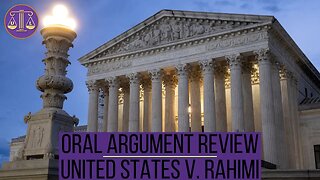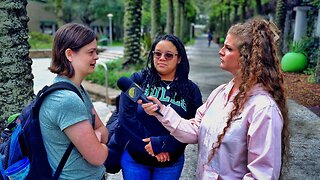Premium Only Content

Woman fined $4M for exercising freedom of speech? What madness is this?
Maggy Hurchalla’s piece of Florida heaven is a patch of pristine Atlantic shore accessible only by boat in St. Lucie Inlet Preserve State Park. She and her husband nicknamed it the “End of the World” when they first came upon it half a century ago, after paddling south along the barrier island to the water’s end. She still likes to skinny-dip at the beach.
Lake Point sued her for interfering with a contract after she emailed Martin County commissioners, urging them to back out of a water deal with the company that had initially been approved as a public-private partnership that could keep polluted water out of a nearby estuary. Ms. Hurchalla argued that she had merely exercised her First Amendment rights.
Three months ago, a state appeals court upheld the verdict, alarming environmental and free speech organizations that had implored the three-judge panel to consider how profoundly such a precedent could chill citizens’ ability to question their leaders.
Ms. Hurchalla appealed again, this time asking for a hearing before the full Fourth District Court of Appeal. On Friday, the court denied her request. She could still petition the Florida Supreme Court to consider her case.
The commission adopted strict protections for wetlands and a four-story height limit for buildings. Growth happened anyway, but slowly and “sanely,” Ms. Hurchalla said, keeping the county green and preserving an Old Florida way of life.
In 1994, she lost re-election to an opponent largely bankrolled by developers. Ms. Hurchalla returned to activism. Even now, she says, “I spend too much time at the computer, trying to save the world.”
That is how she got in trouble with Lake Point, which in 2008 bought 2,200 acres of former sugar cane fields in the western fringes of Martin County, near Lake Okeechobee.
Behind Lake Point was George Lindemann Jr., a billionaire real estate investor and heir to a cellphone and cable TV fortune. He served prison time after being convicted in 1995 of paying a man $25,000 to electrocute his horse so Mr. Lindemann could collect a $250,000 insurance payout.
In 2013, Lake Point sued the county, the water management district and Ms. Hurchalla, claiming she waged an unlawful campaign against the company that cost it its plans to make money off its cleaned lake water.
The court agreed: The litigation found that commissioners conducted public business using their private email and delayed production of those emails — or destroyed them altogether — in violation of public records laws. Three commissioners were charged in criminal court. A jury acquitted one of them in April, and the state attorney dropped the charges against the other two last month.
She had nothing to apologize for, she said: She had engaged her elected leaders. But Lake Point accused her of improperly instructing commissioners through the private emails — and of falsely claiming that the wetlands would be harmed (they were not, the company said) and that no scientific studies had been done (a preliminary review had been conducted). That amounted to malice, the court ruled.
“The First Amendment’s very important, but it has its limits,” said Ethan J. Loeb, the lead lawyer for Lake Point. “You’re not allowed to tell falsehoods. You’re not allowed to lie. That’s not anything that’s new or exotic. And if, in fact, you do not tell the truth, and those falsehoods were designed to injure or harm a business, there’s a consequence for that.”
Lake Point later returned the kayaks and the car. But first, Ms. Hurchalla’s neighbors dropped off other kayaks at her home in solidarity.
“I’ve had several clients contact me with deep concern about whether and what they can say about environmental issues,” he said. “Florida is battling global warming and sea-level rise and the loss of biodiversity, so we cannot afford to be quiet.”
Ms. Hurchalla, as is her style, put it more bluntly: “I don’t think anybody could safely stand at a podium in the state of Florida.”
One evening in July, Ms. Hurchalla, barefoot, with a knife cut on her finger bandaged with duct tape, contemplated the recent events from the screened porch of the home she and Jim built in 1968 after buying a $5,000 lot on the banks of the Indian River. They raised four children there. Two adult grandchildren live nearby.
“I did not expect to be alive at 78,” said Ms. Hurchalla, whose sister died of complications from Parkinson’s disease at 78.
“Look at what the world has done for me,” she said.
She served crackers and smoked fish dip from barracuda that Jim had caught the night before. Then she planned the next day’s paddle, checking on the high tide.
-
 3:02:45
3:02:45
UncivilLaw
1 year agoSupreme Showdown: Unpacking the United States v. Rahimi Gun Rights Battle
486 -
 LIVE
LIVE
Lofi Girl
2 years agoSynthwave Radio 🌌 - beats to chill/game to
200 watching -
 56:48
56:48
The HotSeat
12 hours agoI'm NOT Sorry! Guns Aren’t the Problem—Godless Culture Is
26.1K29 -
 9:43
9:43
The Pascal Show
13 hours ago $0.05 earnedWHOA! Annunciation School Sh**ter Identified... Heartbreaking & Insane
1122 -
 22:42
22:42
Liberty Hangout
7 hours agoCollege Democrats Say Gangs Are GOOD!
47.3K58 -
 2:14:50
2:14:50
Badlands Media
13 hours agoBadlands Media Fantasy Football Live Draft
40.2K -
 2:12:29
2:12:29
Inverted World Live
7 hours agoWe Are Time Travelers | Ep. 100
79.8K12 -
 2:57:09
2:57:09
TimcastIRL
7 hours agoCorporate Press Refuses To Mention Minneapolis Shooter Was Trans | Timcast IRL
187K101 -
 5:26:57
5:26:57
Akademiks
6 hours agoWar in RAT-LANTA. Young Thug vs Gunna vs Ralo vs YSL MONDO. Who Will Le Bebe Pick. FINAL CRASHOUT!
54.5K3 -
 1:02:24
1:02:24
Man in America
10 hours agoThe Final Battle: Nanotech, Transhumanism & the War for Your Soul w/ Dr. Ed Group
44.8K6